- Home
- Timothy Zahn
Coming of Age Page 5
Coming of Age Read online
Page 5
“Didn’t want any of her friends to know about it?” Tonio suggested.
“Maybe. I would have thought Barona was more liberal about such things, though.” He read further. “Strange. I’d assumed Colin was adopted because his parents died soon after he was born, but I guess not—his mother simply walked out the day afterward and disappeared.”
“Sounds like a real winner,” Tonio said, a touch of disgust creeping into his voice.
“Yeah. Seems odd, though,” Tirrell said, rubbing his chin thoughtfully. “If her partner cut out on her when he found out she was pregnant and she didn’t want to raise the baby alone, why didn’t she simply arrange beforehand for the baby to be adopted? It would have saved everyone a lot of trouble and given her a little money during the pregnancy, besides.”
“Maybe her partner was married and she didn’t want to have to name him.”
“Maybe.” Tirrell sighed and fished out his note pad. “Let’s put our supposers on ice for the moment—we may get the chance to simply ask her. Let’s see. The obstetrician knew Colin’s birth date, of course, and so did the assisting nurses. Any of the staff on that floor would have been able to look at the records for the next month, before they were sealed away. Then there’s the Brimmers’ neighbors and close friends, and Colin’s biological mother if we can find her. Who else?” He stared at the list, pondering.
“Did the Brimmers ever order a birthday cake for him?” Tonio asked suddenly. “Or have professional help throwing a birthday party?”
“Good point. We can check on that.” He made another note.
“This isn’t going to work, you know,” Tonio said, shaking his head. “We’re going to wind up interviewing half of Ridge Harbor.”
“Oh, it’s not that bad,” Tirrell said soothingly. “Whoever Oliver’s informant is, my guess is we’ll find he was relatively new to his job when Colin came to his attention. That’s because—”
“Wait a second; let me guess.” Tonio stared into space for a few seconds, lips moving silently. “Ah. Because if the informant had been at it longer, we should have had earlier kidnappings like this?”
“Right. Good thinking,” Tirrell said, impressed in spite of himself that Tonio had successfully tracked through the logic. “I guess we’ll start by calling the Brimmers again, find out about birthday cakes and such. Then we should probably try the hospital.” He started to get to his feet.
“Stan?” Tonio had a thoughtful look on his face. “Maybe I’m missing something here … but what exactly does a fagin do with kids, anyway?”
Tirrell sat back down. “Well, fagins do different things, I guess, depending on how cold-blooded they are and what they think they can get away with. Usually, they have their kids using teekay to steal for them, but I know of at least one case where the fagin was hiring the kids out to an underground mine operation that was so carelessly run the local hives wouldn’t let their kids work there. We caught one using the kids to smuggle stuff past customs, too—you may be old enough to remember that one.”
“So they just want cheap labor out of them, right?”
“Basically. What they’re doing is exploiting the kids, who are either taken young or sucked in by big promises. The real tragedy is when the kids hit Transition and get tossed out by the fagin, and then find out that without a hive record they’re not entitled to any education. That doesn’t happen very often,” he added, seeing the look on Tonio’s face, “since we usually catch fagins early enough to give their kids at least some hive time. And the last time it happened in Ridge Harbor, the kid got Basic anyway, at city expense. But even beyond that, the whole experience can scar a kid for life.”
Tonio was still frowning. “All right,” he said slowly. “But if it’s just teekay they’re interested in, why pick on Colin in the first place? The children I talked to said he was small for his age, and that means he’ll be less powerful.”
“Not always; and smaller kids usually keep their teekay a little longer as preteens,” Tirrell corrected absently, staring at nothing in particular. “But that’s still a darn good question—fagins aren’t interested in the long-term teekay characteristics of their victims. And this guy Oliver seems to have latched specifically on to Colin a long time ago.”
“You suppose it was because Colin was adopted? It might not be as hard on his parents that way.”
“Fagins aren’t noted for that kind of consideration, either,” Tirrell said, a bit tartly. “No, there has to be another reason—something about Colin himself. Something the average person wouldn’t know, perhaps?” He got to his feet and started back toward the vault door. “Let’s go find out.”
The preteen followed him. “We going to call the Brimmers?”
Tirrell shook his head. “I think we’ll start at the hospital instead. I’d like to take a good look at the rest of Colin’s medical records. And at the people who compiled them.”
Chapter 6
“NOW LOOK, KELBY, THIS is ridiculous,” Jarvis said as patiently as possible into the radiophone. “I’m supposed to be on vacation out here, remember? Or is one week your idea of a long time away from the lab? I don’t want to hear about your troubles.”
“Now, now, Matt; let’s not overdo the hyperbole, eh?” Even Jarvis’s less-than-magnificent equipment couldn’t filter out the bluff good humor that was a permanent feature of Kelby Somerset’s voice. “In the first place, this is not going to become a regular event; and in the second place I doubt very much you’re really forgetting about work out there. I’ll lay you very heavy odds you’ve got yourself a cozy little lab in this allegedly rustic cabin of yours. You’re probably working your tail off, making twice your usual progress now that you don’t have to worry about trivia like staff meetings and faculty lunches—not to mention simple food and sleep—”
“All right, all right,” Jarvis interrupted with a sigh. “I give up. Ask your question and let me get back to my book, okay.”
“Right. It’s about the results of that test you and Cam ran last month—the induced-hibernation one. We’ve been running through the data and are getting a strange sort of anomaly between the eight-and ten-milligram dosages. The rate of decrease of heartbeat, respiration, and brain electrical activity goes way down all of a sudden. As you increase the dosage the decreases plot out smoothly, but that discontinuity’s driving everybody crazy. We’ve looked at the obvious possibilities and they all washed out. I thought you might have a brilliant suggestion or two on something new to try.”
Jarvis sighed. “Disturbing my privacy isn’t enough—now you want long-distance prophesy, too?”
“Not necessarily. If you want to sneak back to the lab for a day, I promise I won’t tell anyone.”
“Thanks a lot,” Jarvis growled. “All right; read me some relevant numbers, will you?”
“Sure. Here are the blood insulin levels for the eight-milligram subjects …”
Listening with half his attention, Jarvis stretched his neck to peer out the window. Colin was still in sight, playing at the foot of the big conetree next to the grassy path that served as driveway. As he watched, two large seed pods shot past the boy’s head; Colin was apparently still playing dogfight. He was good at it, too, for someone his age. Jarvis made a mental note to take a dexterity/control measurement soon.
Somerset finished his recitation, and an expectant silence took its place. With some effort, Jarvis forced his mind back to the topic at hand. “Okay. First off, check to make sure the thyroid isn’t suddenly boosting thyroxin production to compensate.”
“We’ve already looked for that—”
“And check carefully, because what the extra thyroxin may be doing is chemically linking to our gamma component, which would not only take both molecules out of play but also keep you from detecting the hormone increase.”
There was a brief silence. “I didn’t know the two hormones could react together.”
“They haven’t in lab tests, but if you look closely at the gamma molecu
le’s sulfhydryl end, you’ll see there’s no particular reason why the reaction can’t go. Check for likely-looking enzymes in the neighborhood of the thyroid, and while you’re at it check back a step and see if the pituitary increased its own thyrotropin output.”
“Already tried that,” Somerset said with the distracted air of someone trying to talk while scribbling notes. “Negative result.”
“Okay, concentrate on the thyroid region, then.” Jarvis considered. “One other thing: try doing a careful study of prostaglandin levels. Our alpha molecule’s largely a prostaglandin analogue, and the body mechanisms that degrade those hormones may be attacking it. If so, we’ll need to isolate which one the culprit is and put something else in the mixture to suppress it. You think that’ll keep you busy for a while?”
“Quite a good while, I think,” Somerset said. “Thanks a lot, Matt—appreciate it muchly.”
“Glad to help. You find anything interesting, let me know—by writing it up and putting it on my desk.”
“Hint received and understood. Talk to you later.”
“Much later. Good-bye.”
Hanging up, Jarvis glanced out the window once more to make sure Colin was still in sight before heading outside. Walking around the corner of the cabin, he managed to duck as a seed pod came sailing through the air. It rounded the edge and he heard it drop to the ground.
“I can’t make it go round the house,” Colin complained as Jarvis came up.
“Well, that’s because you can’t see it after it goes around the corner,” Jarvis told him, sitting down beside the boy. “In order to teek something you have to be able to either see it or touch it.”
“Why?”
“Well …” It was a good question, actually, one nobody had ever figured out a satisfactory answer to. “It’s just the way things are, I guess.”
“Why?”
“I don’t know. Tell you what—why don’t we see if you can figure out a way to do it.” He glanced around. “Would you teek a seed pod over here, please?”
“Okay.” From above them came the snich of a green stem being broken, and Jarvis looked up as a pod drifted down. “Why do the branches go around?” Colin asked.
Jarvis reached out to catch the pod as Colin, shifting his attention to the spiral limb arrangement of the conetree, lost control of it. “A lot of plants have leaves that spiral up a stem like that,” he explained. “The conetree just takes the process a bit farther and does it with branches, too.”
“Why?”
“Probably to let all the leaves get as much sunlight as possible. You see—on that conetree, over there—see how the branches get shorter as you go up? That keeps the upper branches from shading the lower ones and lets all the leaves get sunlight.’
“Why do they need sunlight?”
“It’s one of the things they eat,” Jarvis said briefly. He’d fallen into this trap with Colin already twice in the past two days. The boy wasn’t interested in answers nearly as much as he was in keeping the string of questions going as long as possible. “Here, let’s do an experiment, okay?” he suggested, holding up the pod.
“What’s a ’speriment?”
“A way to keep little boys quiet,” Jarvis said, tapping him lightly on the nose with the pod.
Colin giggled and Jarvis moved the pod thirty centimeters away, holding it horizontally by one end at the level of the boy’s eyes. “Wiggle the pod a little, would you? Just a little,” he added hastily as the pod nearly spun out of his hand.
The amplitude decreased until it was a barely detectable quiver. Colin was being a little silly, Jarvis knew, but he could live with that. “All right. Now I want you to look at the pod very carefully so that you know exactly where it is,” he instructed the boy. “Then close your eyes and try to teek it without looking. Okay? Okay, close your eyes.”
Colin did so, and the pod’s vibration abruptly ceased. “Keep trying,” he said soothingly as Colin’s features twisted up with concentration. Someday, Jarvis told himself, he would get around to studying exactly why direct visual, tactile, or kinesthetic feedback was required for teekay to function. Someday when Ramsden runs out of projects for me to do, he thought sardonically.
Thoughts of Ramsden and the university made him frown. Somerset, for all his perpetual cheerfulness, really wasn’t as insensitive to others as he often appeared. If he’d felt it necessary to break into Jarvis’s officially ordered vacation, it was either because the hibernation experiment was sinking itself into a hole deep enough to strike magma or else because he was getting pressure from either Ramsden or someone higher up. Either way they could very easily be asking him to come back in for a few days long before his vacation was over.
What would he say if that happened? He couldn’t very well take Colin back with him; chances were the Ridge Harbor police had papered every police station on the continent with the boy’s picture by now. But neither could he leave the child alone in the cabin. He was too young to handle things like meals for himself, and there was always the possibility that he would hurt himself, perhaps badly. The posthypnotic sleep code word was there, of course, but Jarvis knew hypnotic commands tended to break down when the subject got hungry or thirsty. He still had a supply of the sleep drug he’d used in the kidnapping, but Colin had already had two doses of the experimental drug and Jarvis had no intention of mixing chemicals like that. Aside from clouding test results, it could be downright dangerous.
The pod twitched, and Jarvis’s adrenal flow jumped with it. Jerking his attention back to Colin’s face, he was just in time to see the slitted eyelids snap closed. “I saw that,” he said sternly, letting his sudden thrill of excitement drain away. “Try it again, and this time don’t cheat.”
“Do I have to?” the boy asked plaintively, looking up at Jarvis and shifting restlessly on the grass.
“Yes—but only once more,” Jarvis told him. “Then you can go play again.”
Colin sighed theatrically, “Okay,” he said and closed his eyes again.
It was a good thing the Brimmers had instilled such a healthy measure of obedience in the boy, Jarvis reflected as Colin again frowned blindly in the direction of the pod. The boy’s teekay strength would be growing rapidly over the next few weeks, which would correspondingly decrease Jarvis’s power to physically enforce commands. He could only hope that the boy didn’t realize that before he could be returned to civilization. For the first time in his life, Jarvis began to truly understand how the parents of the Lost Generation must have felt.
“I can’t do it,” Colin said at last, sounding frustrated.
“That’s okay,” Jarvis told him. “Don’t worry about it. Here—why don’t you see if you can teek the pod all the way over the chimney, okay? Then you can play for a couple of hours before it’ll be time for dinner.”
“Okay.” Obviously relieved to be back on familiar ground, Colin teeked the pod from Jarvis’s hand and sent it skittering between the conetree’s lower branches. Craning his neck as he stood up, Jarvis saw the pod sail high over the cabin.
Smiling, he headed back toward the cabin door. Dinner would be trehhost pasta—one of Colin’s favorite dishes, he knew from his Vaduz Park conversations. He’d better get started on it; the slow-cooking a trehhost required would take a while.
And later that evening there would be games, conversation, and some unobtrusive testing … and, perhaps, another shot.
Chapter 7
IT HAD BEGUN TO cloud up while Lisa was eating dinner, and as she flew over Barona’s lengthening shadows, she decided it would probably start raining by morning. That could be a new headache for the foreman at her construction site; after losing the use of Lisa’s group last Friday, he wouldn’t be happy if a heavy rain deprived him of their services tomorrow as well. But rain in the eyes could cause kids to lose their grip at crucial times, and no builder was foolish enough to risk that. Gavra wouldn’t permit it, anyway.
The Lee Introductory School was in a section of Baro
na Lisa had only visited once or twice before, and it took some hunting before she finally located the squat three-story building. After the tall, majestic towers of the hive, Lee Intro seemed almost self-consciously earthbound, and it made her feel a little creepy as she landed by its front door. I’ll be just as earthbound soon, she thought. Steeling herself, she walked inside.
The door opened into a spacious lounge about half-full of teens, many of them frowning intently into colorful books. The room itself was much friendlier and less intimidating than the reading area at the library had been, but still Lisa hesitated at the threshold. Maybe she should just go home and forget all of this—
“May I help you?” a courteous voice came from her right.
Startled, Lisa turned and saw for the first time the alcove just inside the outer door. A young adult sat behind a desk there, a telephone and long sheet of paper in front of him.
“I’m looking for Daryl Kellerman,” she said, stepping over to him. “He used to be at the Dayspring Hive.”
The man ran a finger down his paper, stopped midway and slid it sideways. “Kellerman … well, he hasn’t checked out and he’s not listed on special duty, so he’s probably up in his room. You want me to call up there?”
“Yes, please,” Lisa said quickly, before she could lose her nerve.
“Who shall I tell him is here?”
“Lisa Duncan.”
The man picked up the phone, consulted the paper again, and punched numbers. “There’s a Lisa Duncan here to see Kellerman,” he said a moment later. “…All right. He’ll be right down,” the man told Lisa, hanging up the instrument.
Lisa nodded and drifted away from the desk, wondering which direction Daryl would come from. Her heart was pounding and she could feel her courage draining away with the moisture in her mouth. What am I going to say to him? she thought frantically. She hadn’t yet come up with a good answer to that when a door on the left side of the lounge opened and Daryl was there. He spotted Lisa and came toward her.

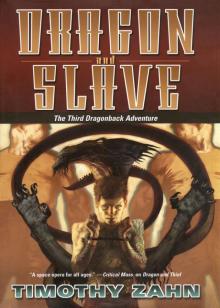 Dragonback 03 Dragon and Slave
Dragonback 03 Dragon and Slave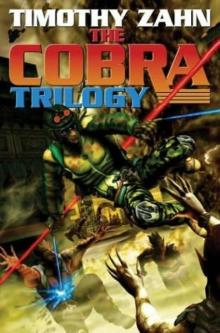 Cobra Bargain
Cobra Bargain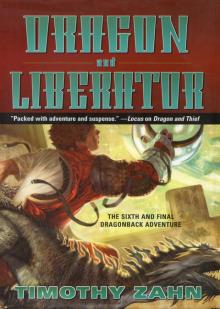 Dragonback 06 Dragon and Liberator
Dragonback 06 Dragon and Liberator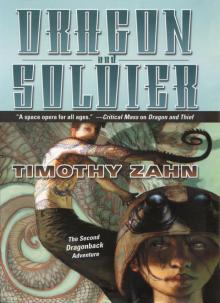 Dragonback 02 Dragon and Soldier
Dragonback 02 Dragon and Soldier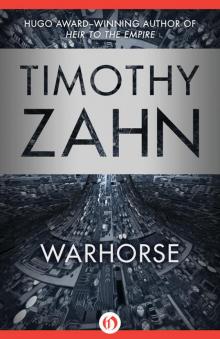 Warhorse
Warhorse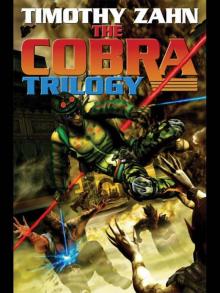 The Cobra Trilogy
The Cobra Trilogy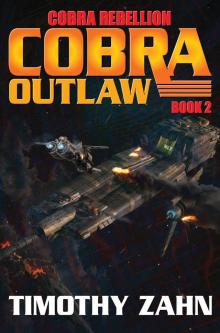 Cobra Outlaw - eARC
Cobra Outlaw - eARC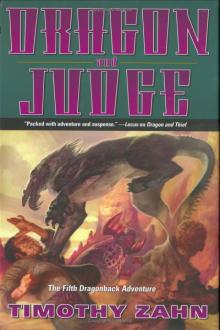 Dragon and Judge
Dragon and Judge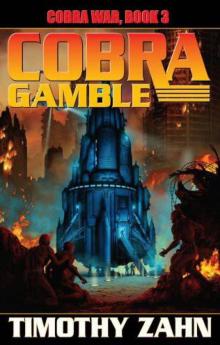 Cobra Gamble
Cobra Gamble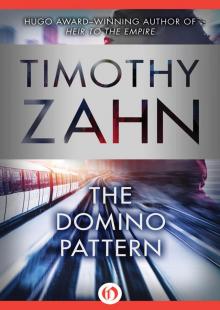 The Domino Pattern
The Domino Pattern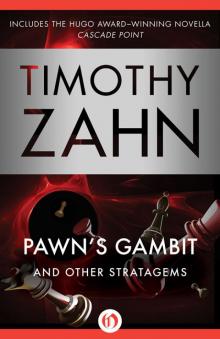 Pawn's Gambit: And Other Stratagems
Pawn's Gambit: And Other Stratagems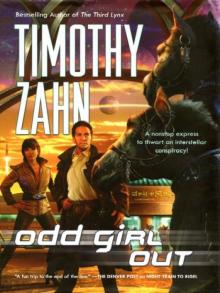 Odd Girl Out
Odd Girl Out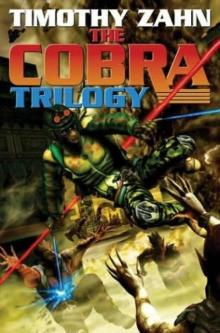 Cobra Strike
Cobra Strike Angelmass
Angelmass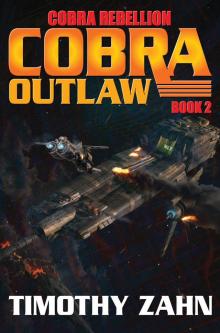 Cobra Outlaw
Cobra Outlaw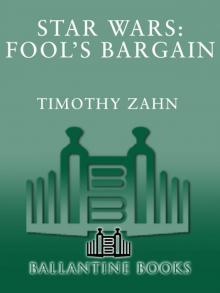 Heir to the Empire
Heir to the Empire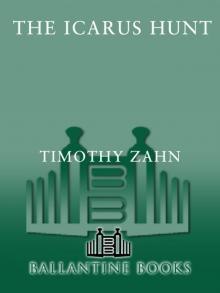 The Icarus Hunt
The Icarus Hunt Star Wars - Thrawn Trilogy - The Last Command 03
Star Wars - Thrawn Trilogy - The Last Command 03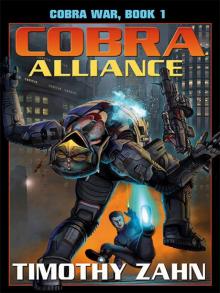 Cobra Alliance
Cobra Alliance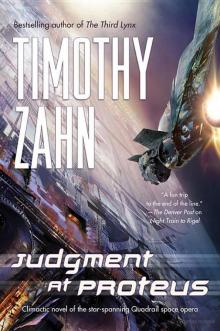 Judgment at Proteus
Judgment at Proteus Star Wars - Thrawn Trilogy - Dark Force Rising 02
Star Wars - Thrawn Trilogy - Dark Force Rising 02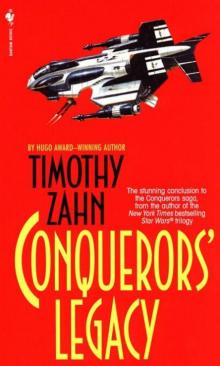 Conquerors' Legacy
Conquerors' Legacy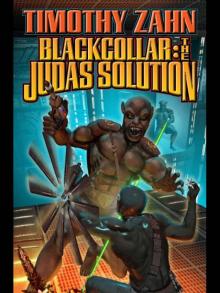 The Judas Solution
The Judas Solution Conquerors' Pride
Conquerors' Pride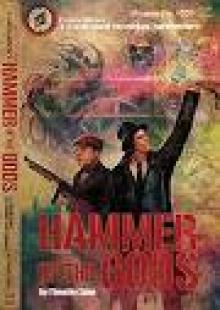 Hammer of the Gods
Hammer of the Gods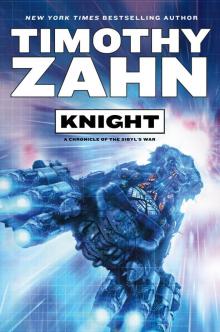 Knight
Knight Ghost Riders in the Sky
Ghost Riders in the Sky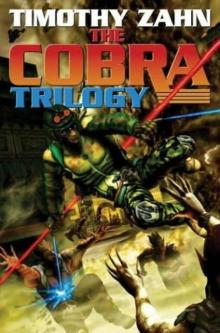 Cobra
Cobra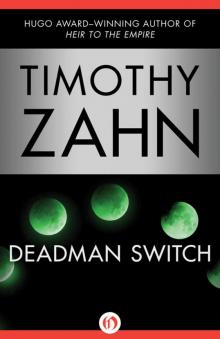 Deadman Switch
Deadman Switch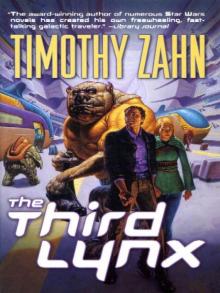 The Third Lynx
The Third Lynx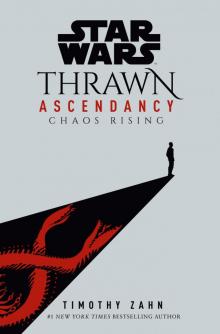 Chaos Rising
Chaos Rising Star Wars - Thrawn Trilogy - Heir to the Empire 01
Star Wars - Thrawn Trilogy - Heir to the Empire 01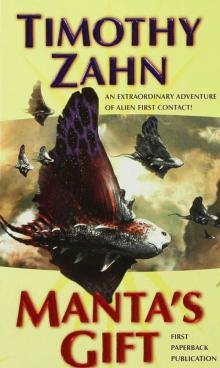 Manta's Gift
Manta's Gift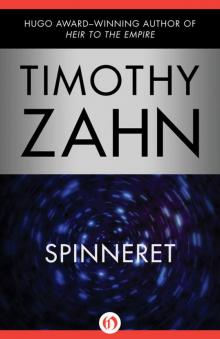 Spinneret
Spinneret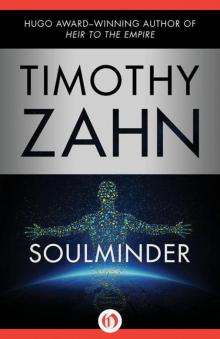 Soulminder
Soulminder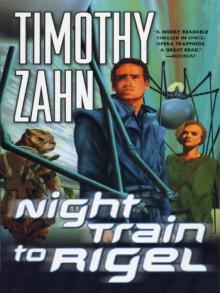 Night Train to Rigel
Night Train to Rigel Blackcollar
Blackcollar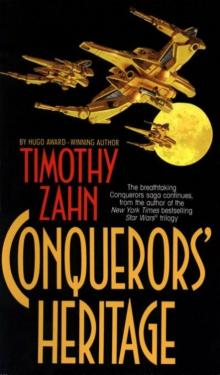 Conquerors' Heritage
Conquerors' Heritage Cobra Slave
Cobra Slave A Coming of Age
A Coming of Age Triplet
Triplet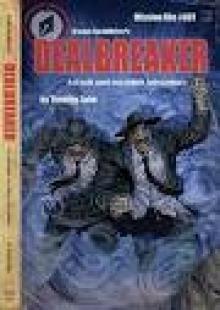 Dealbreaker
Dealbreaker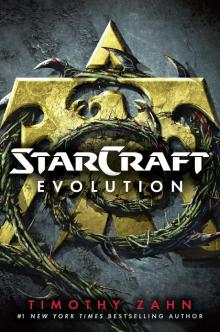 StarCraft
StarCraft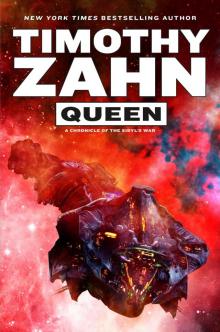 Queen
Queen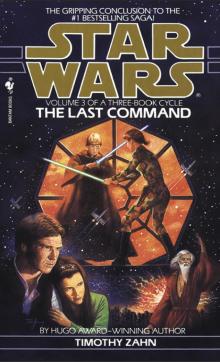 The Last Command
The Last Command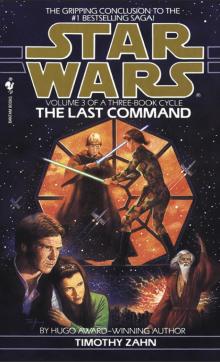 Star Wars: The Last Command
Star Wars: The Last Command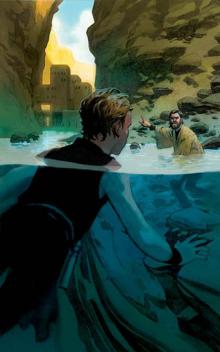 Star Wars Clone Wars: Changing Seasons
Star Wars Clone Wars: Changing Seasons Scoundrels
Scoundrels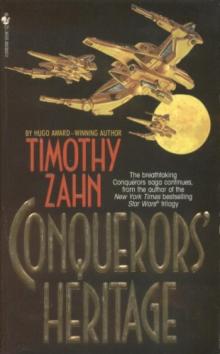 Conquerors 2 - Conquerors' Heritage
Conquerors 2 - Conquerors' Heritage Outbound Flight (звёздные войны)
Outbound Flight (звёздные войны)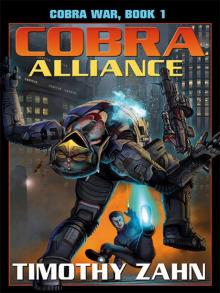 Cobra Alliance-Cobra War Book 1
Cobra Alliance-Cobra War Book 1 Hero of Cartao 2. Hero's Rise
Hero of Cartao 2. Hero's Rise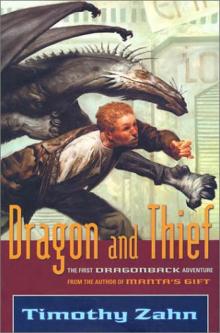 Dragon and Thief d-1
Dragon and Thief d-1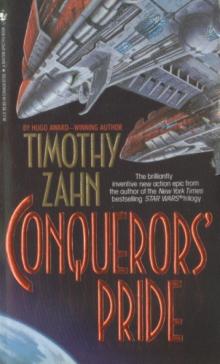 Conquerors 1 - Conquerors' Pride
Conquerors 1 - Conquerors' Pride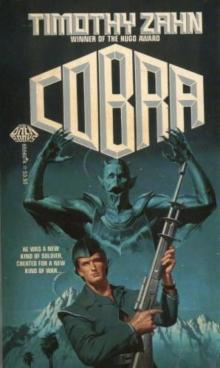 Cobra Alliance cw-1
Cobra Alliance cw-1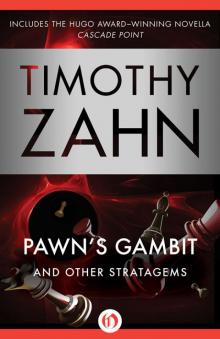 Pawn’s Gambit
Pawn’s Gambit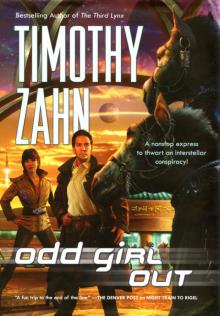 Odd Girl Out q-3
Odd Girl Out q-3 Dragon and Slave
Dragon and Slave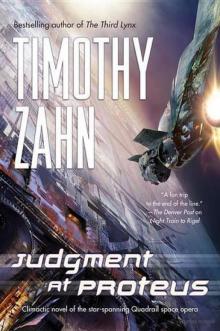 Judgment at Proteus q-5
Judgment at Proteus q-5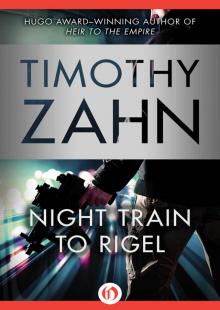 Night Train to Rigel (Quadrail Book 1)
Night Train to Rigel (Quadrail Book 1)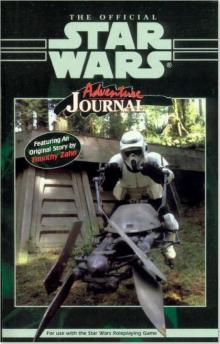 Star Wars: Adventure Journal 11: Command Decision
Star Wars: Adventure Journal 11: Command Decision Dragon And Soldier
Dragon And Soldier Hero of Cartao 3. Hero's End
Hero of Cartao 3. Hero's End For Love of Amanda
For Love of Amanda Distant Friends and Other Stories
Distant Friends and Other Stories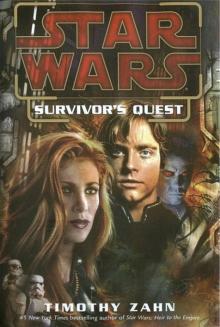 Star Wars: Survivor's Quest
Star Wars: Survivor's Quest Hero of Cartao 1. Hero's call
Hero of Cartao 1. Hero's call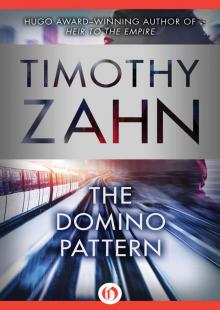 The Domino Pattern (Quadrail Book 4)
The Domino Pattern (Quadrail Book 4)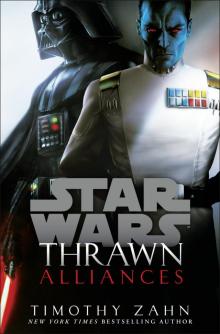 Thrawn_Alliances_Star Wars
Thrawn_Alliances_Star Wars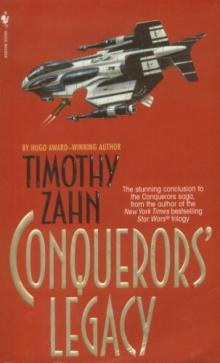 Conquerors 3 - Conquerors' Legacy
Conquerors 3 - Conquerors' Legacy The Blackcollar Series
The Blackcollar Series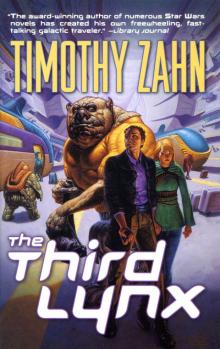 The Third Lynx q-2
The Third Lynx q-2 Terminator Salvation: Trial by Fire
Terminator Salvation: Trial by Fire Star Wars - Mist Encounter
Star Wars - Mist Encounter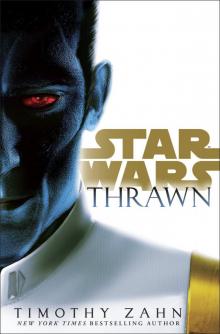 Thrawn
Thrawn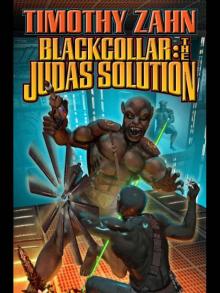 Blackcollar-The Judas Solution
Blackcollar-The Judas Solution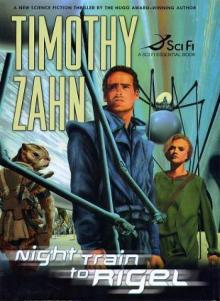 Night Train to Rigel q-1
Night Train to Rigel q-1 Cascade Point
Cascade Point Allegiance
Allegiance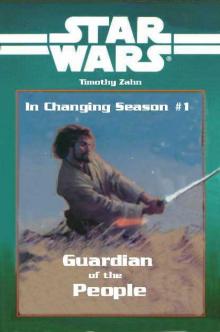 Star Wars - In Changing Season 1 - Guardian of the People
Star Wars - In Changing Season 1 - Guardian of the People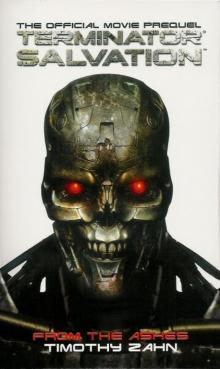 Terminator Salvation - From the Ashes ts-2
Terminator Salvation - From the Ashes ts-2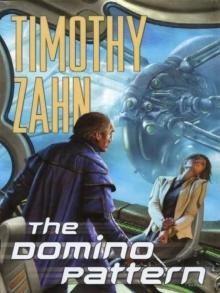 The Domino Pattern q-4
The Domino Pattern q-4 The Big Picture
The Big Picture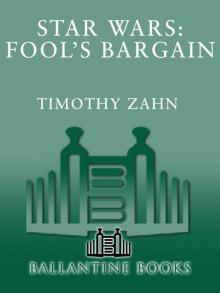 Star Wars: Fool's Bargain
Star Wars: Fool's Bargain Star Wars: Choices of One
Star Wars: Choices of One Star Wars - Jade Solitaire - Unpublished
Star Wars - Jade Solitaire - Unpublished Star Wars: Adventure Journal: Mist Encounter
Star Wars: Adventure Journal: Mist Encounter Outbound Flight
Outbound Flight Star Wars - The Hero of Cartao - Part 1 - Hero's Call
Star Wars - The Hero of Cartao - Part 1 - Hero's Call Thrawn 1 - Specter of the Past
Thrawn 1 - Specter of the Past Survivor's Quest
Survivor's Quest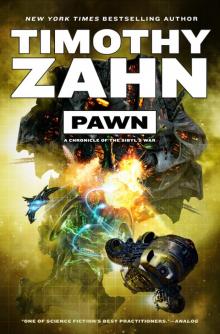 Pawn
Pawn Trial By Fire ts-4
Trial By Fire ts-4 Vision of the future swhot-2
Vision of the future swhot-2 Star Song and Other Stories
Star Song and Other Stories Dark Force Rising
Dark Force Rising Star Wars: Dark Force Rising
Star Wars: Dark Force Rising Star Wars - Outbound Flight
Star Wars - Outbound Flight Blackcollar: The Judas Solution
Blackcollar: The Judas Solution The Green And The Gray
The Green And The Gray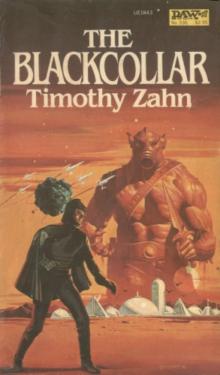 Blackcollar: The Blackcollar
Blackcollar: The Blackcollar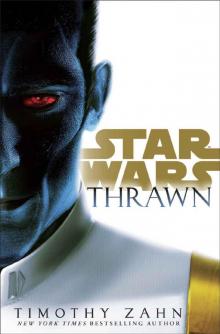 Star Wars_Thrawn
Star Wars_Thrawn Star Wars - Duel
Star Wars - Duel Cobra Slave-eARC
Cobra Slave-eARC Star Wars: Heir to the Empire
Star Wars: Heir to the Empire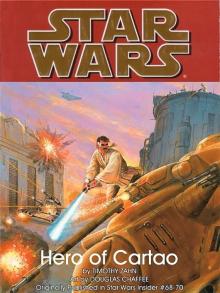 Star Wars: Clone Wars Stories: Hero of Cartao
Star Wars: Clone Wars Stories: Hero of Cartao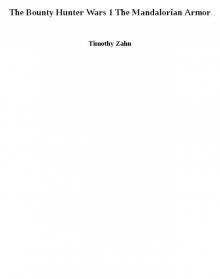 The Bounty Hunter Wars 1 The Mandalorian Armor
The Bounty Hunter Wars 1 The Mandalorian Armor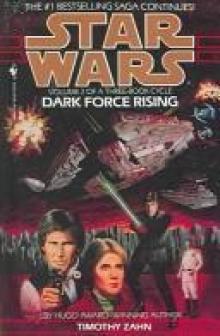 Dark Force Rising (Star Wars) swtt-2
Dark Force Rising (Star Wars) swtt-2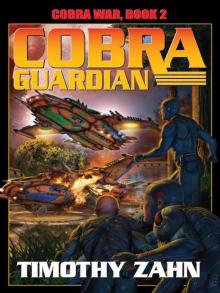 Cobra Guardian: Cobra War: Book Two
Cobra Guardian: Cobra War: Book Two The Third Lynx (Quadrail Book 2)
The Third Lynx (Quadrail Book 2) Time Bomb And Zahndry Others
Time Bomb And Zahndry Others Blackcollar: The Backlash Mission
Blackcollar: The Backlash Mission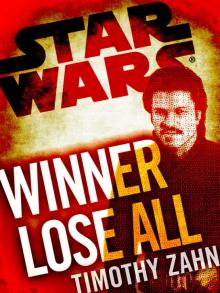 Winner Lose All--A Lando Calrissian Tale: Star Wars
Winner Lose All--A Lando Calrissian Tale: Star Wars Star Wars: The Hand of Thrawn II: Vision of the Future
Star Wars: The Hand of Thrawn II: Vision of the Future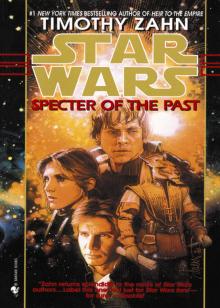 Specter of the Past
Specter of the Past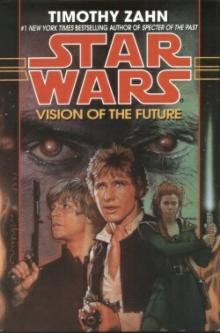 Star Wars - Hand of Thrawn 2 - Vision of the Future
Star Wars - Hand of Thrawn 2 - Vision of the Future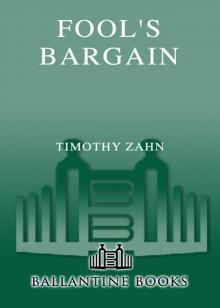 Fool's Bargain
Fool's Bargain From the Ashes
From the Ashes Coming of Age
Coming of Age